Aqeedah
Aqeedah

In the Name of Allâh, the Most Beneficent, the Most Merciful
Aqidah linguistically is derived from the term aqada. In Arabic, one states, "Aqada the rope" when the rope is tied firmly. And, "Aqada the sale" or "He settled the sale" when the person ratifies and contracts a sale or agreement. And Allah says in the Quran, "And as for those whom your right hands have made a covenant (Ar., aqadat)" [Al-Nisa 33]. And Allah also says, "But He will take you to task for the oaths which you swear in earnest (Ar., aqadtum) [Al-Maida, 89] which means asserted and adhered to, as proven in the verse, "And break not oaths after the assertion of them" [An-Nahl, 91]. If one says, "Aqadtu such and such," it means his heart is firm upon such and such. Therefore, Aqidah or I'tiqad according to the scholars of Islam is: The firm creed that one's heart is fixed upon without any wavering or doubt. It excludes any supposition, doubt or suspicion...
Sharh Aqeedah al-Tahawiyyah
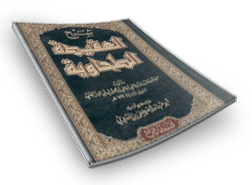
By Ibn Abi al-Izz. Commentary by Allamah Ibn 'Izz Al-Hanafi on Imam Tahawi's Al-Aqeedah At-Tahawiyah. About the Author: A Hanafi Jurist, born in Taha (that's where Tahawi came from), a town in Upper Egypt. Both of his parents were learned and attended Imam Ash-Shafai's lectures. Became a Hadith scholar, but also developed an interest in Hanafi Fiqh. Thus, he was both-- a Muhaddith and a Faqih. He wrote many books, mostly on Fiqh. Compiled a brief list of Core Beliefs of Ahl-al-Sunnah wa al-Jama'ah, now known as Sharh al-'Aqidah at-Tahawiyyah. Imam At-tahawi said about this compilation: "This is a presentation of the beliefs of ahl-al-Sunnah wa al-Jama'ah..."
Courtesy of Saheefah
Book of Emaan
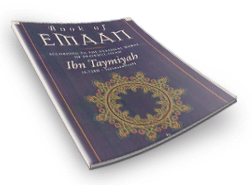
By Shaikhul Islam Ibn Taymiyyah. The source of all evil is the deviation from the truth and its straight path. The goodness of all matters is the following of truth and adherence to its right way. Truth is the fixed state in which Allah has created every creature in a particular way and managed its affair in a certain manner. Allah is Perfect and exempt from any deficiency or error. This book aims to elucidate the pillars of Emaan (basis of belief, faith) and the characteristics of Kufr (disbelief) and its causes.
- Download [15 MB]
Allah's Most Beautiful Names and Lofty Attributes

By Muhammad Ibn Khalifah al-Tamimi. Among the subjects that have not been adequately covered in the English language, perhaps the most important of them is the one covered in the pages of this book. The author presents the belief of Ahl al-Sunnah wal-Jama'ah, which is the creed of the first few generations of Muslims and those who followed in their footsteps. Besides outlining the principles and foundations of this creed he also highlights some of the foreign ideas and deviant concepts that have crept into the hearts and minds. The style in which this book has been written relates more to a textbook than to a book for casual reading. The author has carefully structured the book, divided it into clearly headed sections and provided all the necessary definitions and explanations that will facilitate a clear understanding of this immensely important branch of knowledge.
The Grave - Punishments and Blessings
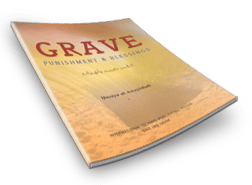
By Husayn al-Awayishah. Question abound about what happens after death. In western societies, in particular, there is a great deal of speculation on these matters. Mulsims, however, have answers to these quetions. Islam tells us what we can expect when we have finally made our exit from this world; we are also given ample guidance as to how we may best prepare ourselves and earn the rewards of Paradise in the Hereafter. In this book the author outlines the Islamic teaching on death and the grave. It is an essential reading for any Muslim who wants to know more about the topic from the authentic sources of Islam.
Book of the End - Great Trials & Tribulations

Like everything, the present universe will also come to an end, and it is a part of our faith to believe in the Last Day. The signs of the Day of Judgment have been foretold by our Prophet (S). Ibn Kathir has collected all the prophesies of the Prophet (S) in his book Al-Bidaayah wan-Nihaayah. In this volume, we have presented from them the signs of the Hour and the events that are yet to take place, although mentioning very few examples of those prophesies that have already been realized.
- Download [22 MB]
Explanation of al-‘Aqeedatul-Hamawiyyah

By Imaam Muhammad Ibn Saaleh al-'Uthaymeen. Allah upholds His religion with His close helpers upon whom He bestows Eemaan, knowledge, and wisdom by which they prevent these enemies. They repel their plot back against their own throats. So no one ever comes out with his innovation except that Allaah – and for this deserves praise and thanks – destines to send someone from Ahlus-Sunnah who refutes and disproves his innovation and extinguishes it. He has many works on the clarification and explanation of the Sunnah, the reinforcement of its pillars, and the destruction of innovations. One of the works on this subject is his “al-Fatwaa al-Hamawiyyah” which he wrote as an answer to a question presented to him in the Hijrah year of 698 from Hamaah, a place in ash-Shaam. In it, he was asked what the scholars and Imaams of the religion say concerning the Aayaat and the Ahaadeeth of the Sifaat, or the attributes and characteristics of Allaah. So he answered in about 83 pages and due to which, he suffered trials and afflictions. May Allaah reward him on behalf of Islaam and the Muslims with the best of rewards. Due to the difficulty in understanding and comprehending this answer from many readers, I wanted to summarize the most important points from it along with some other needed additions. I have named it “Fathu Rabb-il-Bariyyah bi-Talkhees al-Hamawiyyah.”
This is our Aqeedah
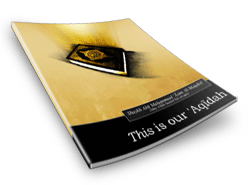
“This is our ‘aqidah . Whoever possesses two eyes then let him read and whoever possesses hearing then let him listen!” All praise is for Allah, the Lord of the worlds, the Most Compassionate, the Most Merciful, the Master of the Day of Judgment. May the salah and the salam be upon the seal of the Prophets and Messengers and upon all of his family and companions. To proceed: This is a summary of what we believe in and what we worship Allah with from the most important areas of the din . I wrote it in my jail cell after it had reached me that there were some people who were ascribing things to us and putting words in our mouths that we have never said; in particular, in the areas of kufr and iman . Before this, I was never concerned with writing about the likes of this subject. That is because our scholars have sufficed and fulfilled in that.
Allah (swt) Governance on Earth

Taken from author's introduction, ' I hope that you on reading these words are found to be in sound health and strong imaan. Due to the absence of books in English regarding Tawhid-ul-Haakimiyyah it was deemed necessary to put together this large research work on the subject. We were also grieved to find that this subject was not being given the attention that it deserves by shaikhs, maulana’s, mosque committees and the average Muslim. Along with this, and the negligence of the scholars and their adherents in presenting the ails of the Ummah and giving the workable solutions, we saw the impending reality of putting together a research covering the most common controversy today, the Shari`ah and it’s implementation.'
The Friends of Allah & The Friends of Shaytan

By Shaykhul-Islam Ibn Taymiyyah
The Decisive Criterion between the Awliyaa of The Most Merciful and the Awliyaa of Shaytaan Indeed the enmity between man and Shaytaan is old, commencing from the time that Adam (alayhi as-salaam) was created, from the time he was ordered to prostrate to him. Shaytaan refused, become arrogant and hence disobeyed his Lord. His arrogance and pride let him to commit a whole host of sins, it made him expend every effort in misleading the children of Adam and made him beautify and embellish sins such that they accepted them and eagerly committed them Due to this Allah the exalted revealed the Books sent the Messenger and enjoined His servants to various injunctions and admonitions in order to secure them from the evil of Shaytaan. In the light of His advice, profound injunctions and admonitions in order to secure them from the evil of Shaytaan. In the light of His advice, profound injunctions and sever warnings, mankind becomes separated into two groups: a group who were guided and a group who deserved to be misguided. The groups who were guided are the inhabitants of Paradise and the groups who were misguided are the denizens of the Fire. The inhabitants of Paradise are the Awliyaa of the Most Merciful and the denizens of the Fire are the Awliyaa of Shaytaan.
Taqwiyat-ul-Iman (Strengthening of The Faith)
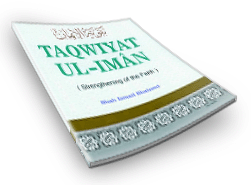
Shah Isma'il Shaheed
The author refers to the Quranic verses and Ahadith by interpreting them in a very simple and comprehensible style, and also brings to light the true status of all the unlawful customs and rituals which are commonly practiced in the society and are detrimental to the faith of Tauhid. Tauhid (Oneness of Allah) is the basis of the Islamic religion.
The Fundamentals of Tawheed (Islamic Monotheism)

Dr. Abu Ameenah Bilal Phillips
This book presents a detailed explanation of the classical Islamic concept of God's unity as it relates to faith and acts of religious devotion. It also discusses the major areas within which the Islamic unitarian belief (Tawheed) is either nullified or compromised by idolatrous concepts and practises, collectively called Shirk
At-Tadhkirah (The Reminder)
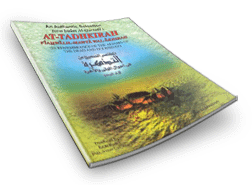
An Authentic Selection from Imam Al-Qurtubi's At-Tadhkirah Fiahwalil-Mawta Wal-Akhirah
Death is not the absolute end. It is just the discontinuation of unity between the body and soul. It is a change from one state to another and a transition from this present life to that of the hereafter
"Allaah takes souls at the time of their death and [the souls] of those that do not die during their sleep. He retains those souls for which He has ordained death, whereas He releases the rest for an appointed term" [TM Qur'an 39:42]
Imam Abu 'Abdullah Muhammad ibn Ahmad ibn Abu Bakr al-Ansari al-Qurtubi, was born in Cordoba, Spain, at the summlt of Its great period of Islamic civilisation. He was an eminent Maliki scholar who specialised in fiqh and Hadith. The breadth and depth of his scholarship are evident in his writings. The most famous of then is his twenty-volume tasfir al Jami' li-ahkam al-Qar'an, Imam al-Qirtubi was a man of great modesty who disdained worldly honours and throughout his life wore the simple gown and cap of the ordinary Muslin. He traveled from Spain to the East and settled in Munya Abi'l-Khusavb. in Upper Egypt. where he died in 671H/ 1273
The Signs Before the Day of Judgement

Ibn Kathir
This book is an extract from Ibn Kathir's book called "Al Bidayah Wa Al Nihayah" (The beginning and the ending). This book is an authoritative source on a matter of central importance to everyone: the events of the here-after. The work is by Ibn Kathir, an eminent Islamic scholar and is based entirely upon authentic Islamic texts and sources. According to many of prophet's sayings, he described the condition in which people would live in those times. Some of the developments foretold by the Prophet (S) have already come to pass. This book summarizes those and others in more detail.
Faith in Predestination (Qada Wa Qadar)

Dr. Suhaib Hasan
Belief in predestination (Qada wa Qadar) is an undisputed article of faith in Islam. For some people, this belief leads to contentment and satisfaction, even in the face of hardship and adversity. But for others, it provides justification for their wrongdoing: how often do we hear people arguing that they should not be blamed for their disobedience since it has already be decreed by Allah that they will sin?
Rays of Faith: Fundamentals of Faith Notes
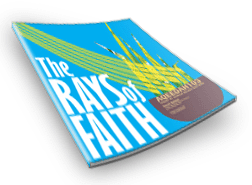
Rays of Faith. A seminar to enlighten the minds and hearts, as we continue on our journey towards Allah SWT and explore the deeper meanings of the last five of the six articles of Islamic faith: Angels, Divine Books, Messengers, the Day of Judgment and Al-Qadar.
An Explanation of Kitab At-Tawhid

The series of ten lectures covers the following topics: CD 1: Etiquettes of the student & teacher of knowledge. CD 2: Shirk- Its definition & its types (major & minor). CD 3: Kufr- Its definition & its types; Nifaq (hypocrisy). CD 4: Study of al-Jahiliyah, al-Fisq & ad-Dalaal; Apostasy. CD 5: Knowledge of the unseen; Magic & fortune-telling; Sacrifices; Rulings of statues & symbols of remembrance CD 6: Ruling on nationalism and 'isms'; Use of ruqyah & amulets. CD 7: Loving the Prophet;Importance of sending salah & salam upon him. CD 8: Virtues of the household and the companions of the Prophet. CD 9: Bid'ah (innovation) - Its meaning, types and ruling. CD 10: Stance of Ahlus-Sunnah towards innovators; Current innovations.
Audios
Aqeedah Al-Hamawiyah | Ali At-Tamimi
Part 1 | Part 2 | Part 3 | Part 4
Sharh of al-Aqîdah al-Wâsitiyyah | Ali At-Tamimi
Part 1 | Part 2 | Part 3 | Part 4 | Part 4 Cont | Part 5 | Part 6
The Reality of Iman | Ammar Amonette
Part 1 | Part 2 | Part 3 | Part 4 | Part 5 | Part 6 | Part 7 | Part 8 | Part 9 | Part 10
The Need To Rule By Allah's Laws | Ammar Amonette
Part 1 | Part 2 | Part 3 | Part 4
 Aqeedah,
Islamic Books,
Islamic Teachings,
Kalamullah
Aqeedah,
Islamic Books,
Islamic Teachings,
Kalamullah
This entry was posted on Sunday, October 18, 2009 , 3:43 AM. You can follow any responses to this entry through the RSS 2.0 feed. or you can leave your own response below.

 or
or 








November 27, 2014 at 5:18 PM
the outlet water leakage: LED taps is because the axis washer inside the Shower Taps wear due. Use pliers to remove the gland bolts loosen, remove the pad to clamp the spindle axis washer can be replaced with Antique Basin Taps.